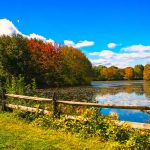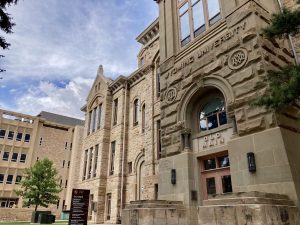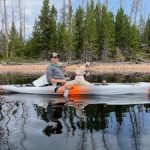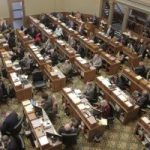Amid lawmaker scrutiny of the University of Wyoming’s curricula, and talk of more legislative involvement in its operations, faculty leaders unanimously oppose legislative interference in campus classrooms, which they say could hamper the university’s ability to recruit and retain high-quality faculty, among other chilling effects.
During the 2022 budget session, the Wyoming Senate tried but failed to bar UW from teaching gender studies courses. The Gender and Women’s Studies program was “extremely biased, ideologically driven that I can’t see any academic legitimacy to,” Sen. Charles Scott (R-Casper) said at the time, arguing for a budget amendment which would have defunded the program.
The scrutiny has continued into the interim session. In a meeting last month between legislators and the UW Board of Trustees, lawmakers repeated their criticism of the Gender and Women’s Studies program. Scott said the program “projects a particular point of view that the majority of the constituents don’t agree with.”
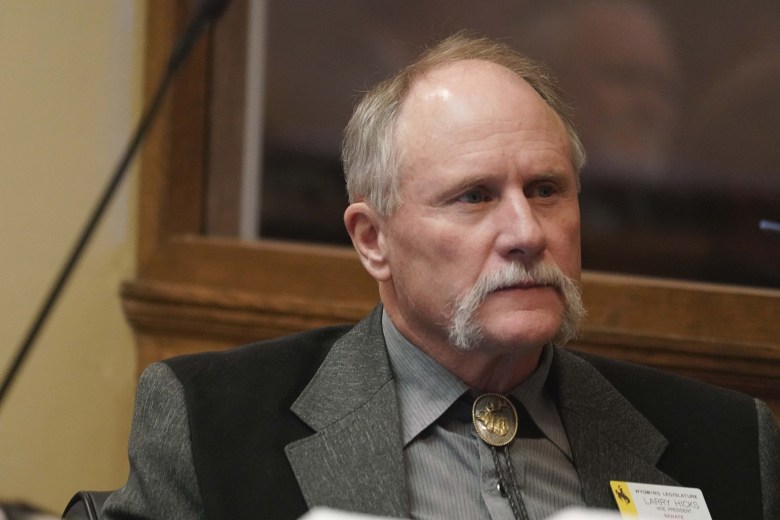 Sen. Larry Hicks (R-Baggs). (Mike Vanata/wyomingdigest.com)
Sen. Larry Hicks (R-Baggs). (Mike Vanata/wyomingdigest.com)
At the same meeting, Sen. Larry Hicks (R-Baggs) said that, by delegating the bulk of managerial authority to the trustees, the Legislature “has abrogated their responsibility.”
The Wyoming Constitution, Hicks noted, declares “the Legislature shall suitably encourage means and agencies calculated to advance the sciences and the liberal arts.” In other words, according to his interpretation, the document urges legislative involvement.
“My expectation as a legislator is to try and build one of the most iconic, revered, institutions in the world,” he said. “That’s my expectation and I think we should all share in that expectation.”
However, heavy-handed legislative involvement including the targeting of specific programs, like Gender and Women’s Studies, is only likely to diminish UW’s appeal for faculty as a whole, Faculty Senate Chair Renee Laegreid told wyomingdigest.com.
“For [the Legislature] to try to dictate what we teach would have a very chilling effect on the university’s goal to be an R1 Institution,” she said. “Academic freedom is important, and there’s nothing that will stifle it faster than knowing the Legislature is looking over your shoulder to see if they approve what you’re teaching.”
During the past decade, UW leaders, as well as task forces convened by former Gov. Matt Mead, developed an appetite for R1 designation. The classification, awarded by the American Council on Education, distinguishes doctoral-degree granting universities as producing the highest level of research. After a decade of construction on state-of-the-art STEM buildings, both Gov. Mark Gordon and university leaders contend it’s time for UW to focus on building its ranks with top-tier faculty.
When the Senate tried to end gender studies programming, it left the larger higher education community with a negative impression of academic freedom in Wyoming, Laegreid said.
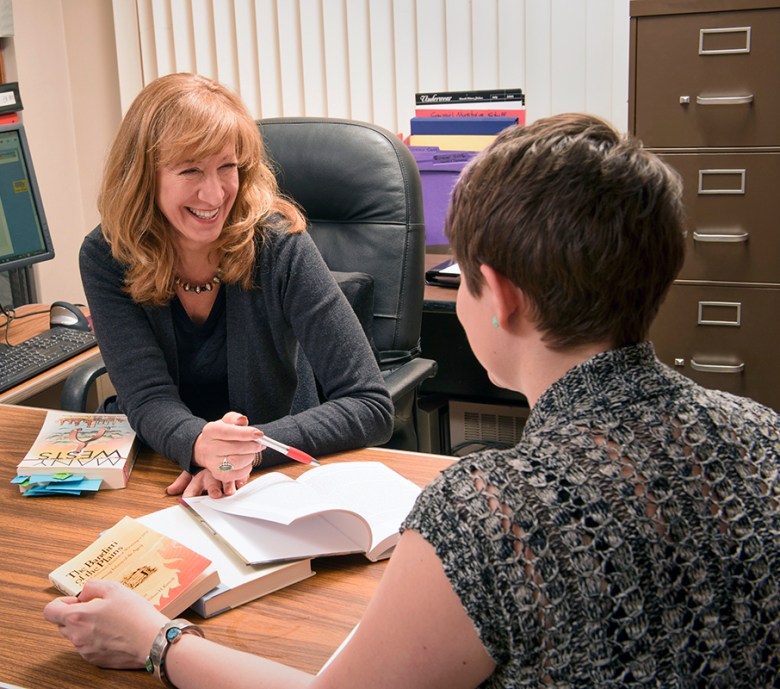 History professor Renee Laegreid meets with a student in her office in 2019. (UW photo)
History professor Renee Laegreid meets with a student in her office in 2019. (UW photo)
“I was getting emails from colleagues all around the country asking ‘what the hell’s going on up there?’” she said.
In interviews with wyomingdigest.com, faculty leaders expressed differing views on whether they believe professors’ political biases are evident in the classroom. All, however, opposed the Legislature getting involved in the issue.
Legislators simply do not have the expertise to be telling professors how to teach the social sciences, Laegreid said.
“Do they know the leading theoretical frameworks? Do they know the leading research areas? I doubt it. That’s not their job. That’s our job,” she said.
Ray Fertig, an associate professor in mechanical engineering who described himself as “one of the few conservative faculty” at UW, believes legislators’ attempt at regulating coursework is ill-advised.
“It’s a dangerous path,” he said. “It seems like it could get into a swing back-and-forth when you get into regulated speech. I think we’re already micro-managed as it is, and I would like to see less of that.”
Too often, Fertig feels progressives have a tendency for censorship.
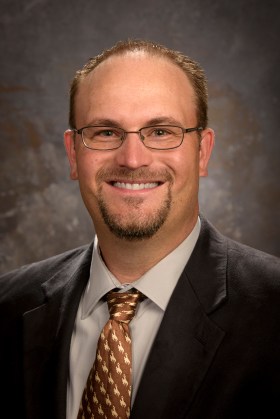 Mechanical engineering Associate Professor Ray Fertig. (UW photo)
Mechanical engineering Associate Professor Ray Fertig. (UW photo)
“I’m concerned that I’m seeing that a bit more on the right, and I don’t like that,” he said.
If legislators believe their involvement in regulating coursework protects students, they’re misguided, Fertig said.
“I don’t think there’s some professor … poisoning their minds,” he said. “They try their best to be fair.”
Fertig stressed that certain coursework that’s drawn the ire of legislators, like the Gender Studies program, is optional for students.
“To my knowledge, no student is being coerced to take anything like that,” he said. “They can avoid it entirely.”
University administrators, meanwhile, say protocol exists for dealing with complaints regarding professors pushing personal viewpoints on students.
In the crosshairs
Michelle Jarman, the director of the Gender and Women’s Studies program, disagrees with the premise that her program suppresses conservative views.
“We’re looking at gender from a variety of perspectives,” she said. “We’re not really trying to push people to believe one thing or another, and our students come in with lots of different perspectives. We work really hard to make all of our students feel welcome in the classroom.”
Before the budget amendment arose in February, no legislators reached out to Jarman to talk about concerns with the program, she said. None have reached out since.
“Our job is not to convert students to our point of view. Our job is to say: ‘Okay, cite your sources. Provide your evidence.’”
Renee Laegreid, UW history professor
Rep. Cathy Connolly (D-Laramie) is a professor of Gender and Women’s Studies and also said none of her colleagues in the statehouse contacted her to discuss their concerns with the program before voting to defund it.
The characterization of the program as ideologically biased is “clearly not based on any type of factual analysis,” she said.
“They are in no way knowledgeable about the course materials and the issues that are taken up,” she said.
Department chairs and program directors are responsible for handling complaints if students feel a professor is pushing an ideology.
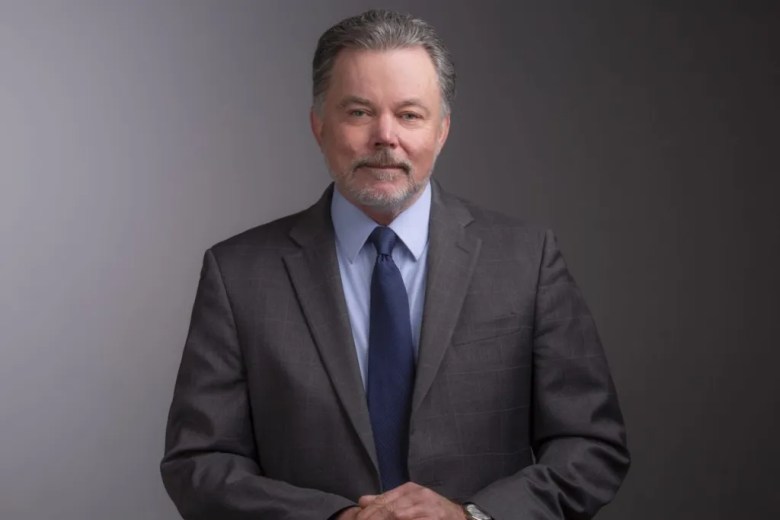 UW Provost Kevin Carman. (UW photo)
UW Provost Kevin Carman. (UW photo)
“We don’t get into the classroom and tell faculty what to teach and how to teach it,” Provost Kevin Carman said regarding his role in the Office of Academic Affairs.
It is a problem, however, if a professor is “clearly espousing a personal point of view or if a professor was offensive or abusive,” Carman told wyomingdigest.com.
“We would need to have that reported before we can follow up, but very rarely does it happen,” he said.
Jarman has been the director of Gender and Women’s Studies for the last two years. While a student might occasionally complain to her about a grade, no one’s complained about being indoctrinated, she said.
“I haven’t fielded any concerns from students about not being made to feel welcome,” she said.
Like faculty members, Carman disagrees with critics’ characterization of the Gender Studies program.
“I have confidence in the credentials of our faculty and their ability to present the information in a scholarly fashion,” he said. “We also have a process whereby each instructor is evaluated by the students in their class.”
Expecting balance
Anyone assuming political thinking at UW is monolithic should visit campus, Carmen said.
“I think that if they were to talk to our students and faculty, they would come away with another perspective,” he said.
The university, he said, works to ensure that competing perspectives are made available to the community.
“We bring thought leaders on campus to challenge our thinking, to give seminars and do question-and-answer sessions,” he said. “That’s another important role that the university plays — helping to explore various dimensions of controversial issues.”
At the July meeting, Scott, Hicks and Sen. Cheri Steinmetz (R-Lingle) agreed that, when it comes to discussing controversial issues at UW, they expect political “balance.”
“It’s concerning when we see an imbalance in a certain area, and it seems that a certain worldview is being given more credence than others and actually being taught as a curriculum,” Steinmetz said. “We are promoting one side to maybe the exclusion of another.”
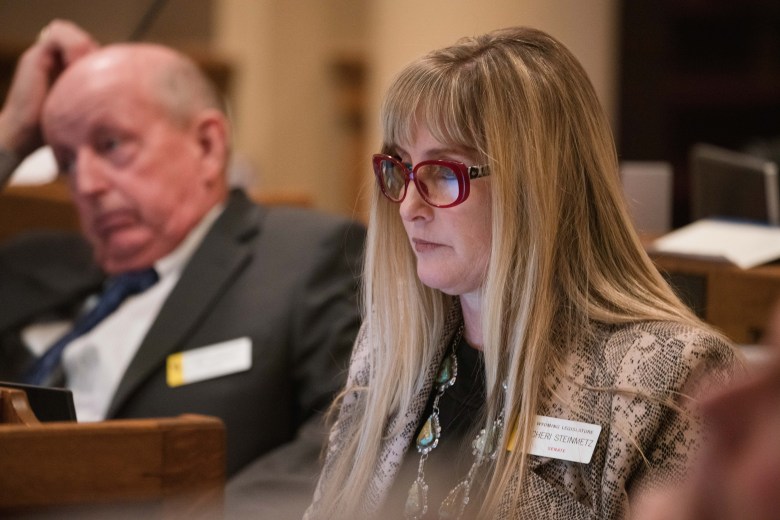 Sen. Cheri Steinmetz (R-Lingle) at her desk on the Senate floor (Mike Vanata/wyomingdigest.com)
Sen. Cheri Steinmetz (R-Lingle) at her desk on the Senate floor (Mike Vanata/wyomingdigest.com)
Steinmetz and Hicks are both members of the Joint Appropriations Committee, which is responsible for recommending what size block grant the Legislature should appropriate for UW each biennium.
Both Hicks and Scott suggested the Legislature has access to tools that would enable it to assert more control of UW.
“The only two tools that the Legislature has is funding and statute … and we will wield those at the will of the people because the electorate has sent us down there to do that,” Hicks said. “There’s a lot of opportunity to work within that arena.”
Scott told the trustees that “the public at large expects the university to have, especially on political, social, historical and economic issues, a diversity of points of view and will tolerate some pretty radical points of view there provided that other points of view are also represented.
“If it gets to be perceived that, as a whole, the university is … suppressing other points of view … then I think the Legislature is capable of taking fairly radical measures to change that,” Scott continued. “That might be appropriate. As long as the university can keep a diversity of points of view, and can be welcoming and civil toward … conservative points of view, you’ll be fine.”
The next day, Gov. Mark Gordon noted the “respectable tension between the Legislature and the trustees as to who is going to govern the direction of the university.”
“That is the mission of the trustees, and it is absolutely essential,” Gordon said. “It can be informed by the Legislature. As one of the three branches of government that are supposed to be co-equal, I can tell you that the Legislature often thinks that they have a role to play in the executive branch, but we each have a role to play.”
Campus history
Faculty leaders pushed back on the idea that UW’s campus culture might be intolerant of “conservative worldviews.”
“That’s hard to believe,” Laegreid told wyomingdigest.com. “I’ve been on campus for 10 years. There may be a professor that isn’t open, but [enforcing certain viewpoints] goes against what we’re here to do. We broach all sorts of topics to get students exposed to all sorts of ideas, to have a lively debate and to develop critical thinking.”
To Laegreid, a history professor, it seems like a handful of legislators want “their conservative viewpoints actually privileged — not balanced.”
Gregg Cawley, a political science professor at UW since 1987, sees the Legislature’s targeting of gender studies programs as part of a “national movement,” just like the historical challenges to academic freedom on campus during the Red Scare.
“It’s just identity politics,” he said. “This has been going on for years — this presumption that university and college professors are liberal lefty types.”
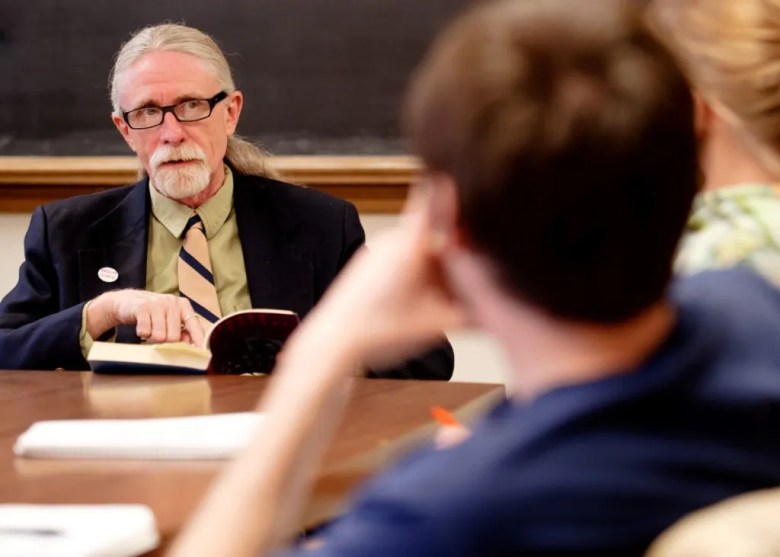 Political science professor Gregg Cawley in 2009. (UW photo)
Political science professor Gregg Cawley in 2009. (UW photo)
In 1947, UW’s trustees launched a committee to examine the university’s textbooks for material that might be “subversive or un-American.”
While some conservatives might feel they’re unpopular at UW, Cawley noted that there are ample instances of liberal perspectives being targeted.
In 2010, Bill Ayers was invited to speak by campus groups. Then a professor at University of Illinois-Chicago, Ayers was more famous for co-founding of the Weather Underground, a left-wing organization that orchestrated a series of non-fatal bombings in protest of the Vietnam War.
The Ayers event was ultimately canceled after UW cited threats of violence.
“There’s never been a similar controversy on this campus involving a conservative speaker,” Cawley said. “We’ve had all sorts of conservative speakers, and there haven’t been any attempts to block them. There’s been some protests and people outside holding up banners, but the only serious attempt to block speakers on campus in the recent past was Bill Ayers, and that’s certainly not suppression of conservatives.”
U.S. Sen. Cynthia Lummis (R-Wyoming) was booed during her commencement speech this spring after she asserted the existence of two sexes, male and female, is a “fundamental scientific truth.” Senate President Dan Dockstader (R-Afton) suggested the booing was a sign that UW condoned “incivility” toward conservatives.
As a conservative academic, Fertig said UW is “infinitely” more accepting of conservatives than Cornell University in Ithaca, N.Y., where he earned his master’s degree and Ph.D.
Still, he said faculty do seem to, on average, have a progressive bent.
“I’ve never been on a campus where it didn’t feel that way. There’s very little that’s spoken from a conservative point of view,” he said, though he noted that he believes students are not “unduly pressured toward a particular worldview” in classes.
It does seem like there are fewer conservative faculty than there were a decade ago, Fertig said.
“I’m not faulting it, but it just needs to be seen for what it is,” he said.
In teaching politics, Cawley said he makes a point to “teach political tolerance” and that “all sides are legitimate.
“That means I know the difference between a pulpit and a lectern,” he said. “But I also point out to students that I’m fully aware that there are other people on campus who don’t understand the difference between the pulpit and the lectern, and they do in fact use their classes to preach.”
Professors of different political persuasions can be equally guilty of that,” he said.
“I know there are some faculty who will probably not encourage conservative views, but we’ve got a whole lot of conservative faculty, and some of them would probably not encourage liberal views,” Cawley said.
Cawley believes conservative legislators’ request for political “balance” at UW to be impractical.
“I’m not exactly certain how you’d measure it. To what degree is somebody’s presentation left-oriented and how much of it is conservative?” he asked. “I do think there is a need for some kind of self-policing — for us faculty to talk among ourselves.”
Classroom rules
In Laegreid’s classes, she said, she works to remove the emotion from classroom discussions on controversial subjects.
“A lot of our students come here without having any of this experience in developing arguments. They get challenged by a professor or other students in the class. And they get offended,” she said. “Our job is not to convert students to our point of view. Our job is to say: ‘Okay, cite your sources. Provide your evidence.’”
Like Laegreid, Cawley said he has his own experience with students who bristle if the subject matter in his lectures aren’t “reinforcing their version of truth.
“Interestingly enough, the students that I have some trouble with almost always tend to be more to the left side of the political spectrum than the right side,” Cawley said.
While legislators have taken aim at academic programs, Fertig sees initiatives implemented by administrators as more partisan than faculty teachings.
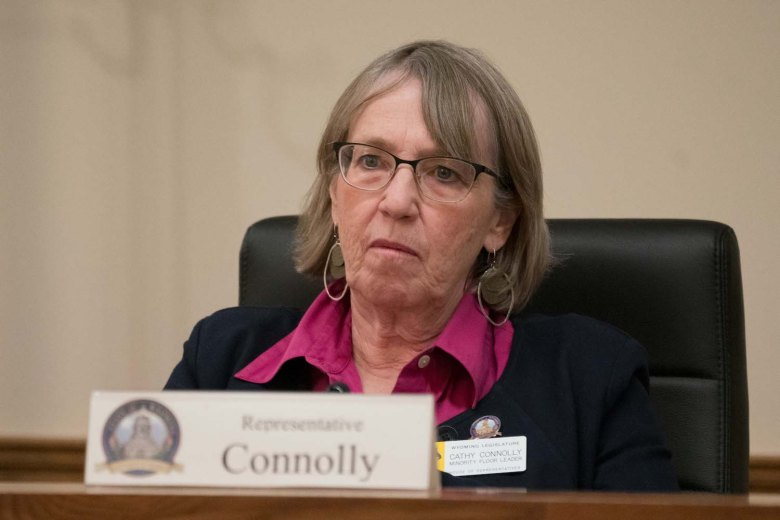 Rep. Cathy Connolly (D-Laramie) during the 2022 Legislative session. (Mike Vanata/wyomingdigest.com)
Rep. Cathy Connolly (D-Laramie) during the 2022 Legislative session. (Mike Vanata/wyomingdigest.com)
Both Connolly and Cawley said the descriptions of “liberal” and “conservative” are inappropriately applied to academic work.
“Everybody wants to move to the liberal-conservative continuum, which has a certain utility, but it masks a lot of what I’m going to argue real-world politics is about,” Cawley said.
Classifying theoretical frameworks used in the Gender and Women’s Studies program as liberal or conservative is “reductive,” Connolly said.
“What we do in our classes is so far more complicated than what we’re hearing from what I would say are very ill-informed legislators who, in fact, are putting their own kind of political views on what we do in Gender and Women’s Studies,” she said.
When it comes to hot-topic issues like abortion or the wage gap, Connolly said her students delve into the material with complexity and from multiple viewpoints.
For abortion, that would mean studying the many opinions written on the subject by the Supreme Court, including majority, concurring and dissenting ones.
For the wage gap, that means examining how the wage gap changes when different variables are taken into account, and then debating possible solutions — or even if solutions are needed.
Criminal Justice Professor Adrienne Freng, who chaired the Faculty Senate last year, wrote in an email that, as a social scientist, she follows the research, not any ideology.
“I think that it is unfortunate that when we pose the research that doesn’t correspond to certain people’s perspectives (which it often doesn’t in criminal justice), that we are labeled as suppressing worldviews (or opinions),” she wrote.
Sticking to the facts presented by research is “one of the roles of institutions of higher education,” she wrote.
“In fact, I hold it in high regard that often my students at the end of my classes don’t know whether I’m a Democrat or Republican (or something else),” she wrote.
The legislative debate about the merits of the Gender and Women’s Studies program, Connolly said, has been a “regrettable waste of time.”
Jarman also said the failed budget amendment has done the program no favors.
“I fear recruiting faculty and I think it will be a big issue,” Jarman said. “Who wouldn’t be concerned about their position if they were specifically being looked at by the Legislature and there was an actual threat of being defunded?”
The post UW faculty wary of Legislature policing classrooms appeared first on wyomingdigest.com.




